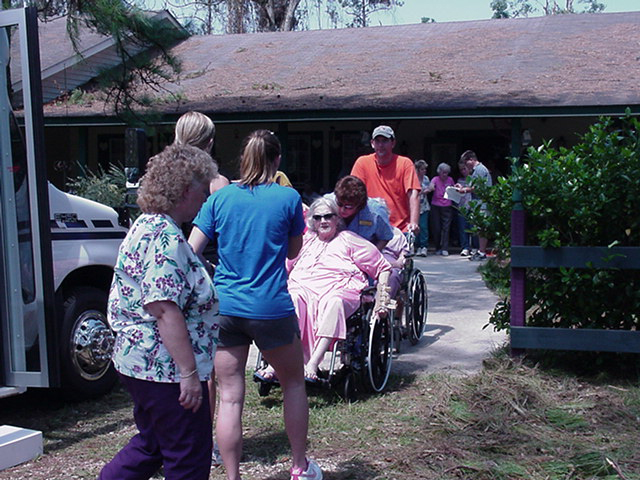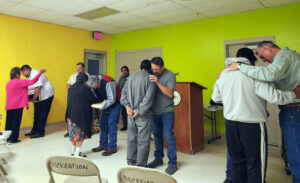
COLUMBUS, Miss. (BP)–The racks above the bus seats held oxygen tanks, bandages and bottles of water, instead of luggage. IV bags dangled from twisted wire hangers above the heads of passengers.
The two Fairview Baptist Church buses, from Columbus Miss., carried a load like never before.
Two days after Hurricane Katrina ravaged the Mississippi Gulf Coast, Tommy Gillon, minister of senior adults at Fairview, agreed to drive a church bus down to Biloxi to pick up eight nursing home residents who were stranded in a personal care home just north of the coastal city.
“My mother is in Home Place nursing home here in Columbus and they called me to see if I could transport eight people from the coast back to their facility,” Gillon recounted. “They had beds open and were willing to take these residents, but needed transportation.”
Knowing that he would need to be self-supporting traveling into the area with no electricity and no water, Gillon started making arrangements for other volunteers as well as for transporting fuel and water. When he called Home Place to let them know plans were in place, he discovered the numbers had changed -– quite a bit.
“They had heard that there were more people at this nursing home [in Biloxi] than they thought. They also told me I would need to bring back equipment like wheelchairs and oxygen tanks,” Gillon said.
Another phone call came before the crew left. This one offered more beds if Gillon could transport the added patients to Arkansas. He agreed.
The next day five volunteers pulled out with two buses — one capable of carrying 34 passengers; the other, 21 passengers — and a pickup truck full of equipment and supplies.
It took less than six hours for the crew to arrive at Ramsey Springs Village in Perkinston. It would take 17 hours to return.
“When we got there, we found a place that houses 12 people, but they had 48 patients who had been evacuated to their facility. They had no electricity or water for three days. They were everywhere. We had to figure out who was going where,” Gillon recounted.
Without toilet facilities, most had sat in their own waste for days. Many were dehydrated and ill. All of them were frightened.
The volunteer nurses started IVs on patients who were obviously dehydrated. Gillon started breaking coat hangers to twist them into makeshift hooks for the IV bags.
Others passed out water and ice.
The buses didn’t have room for everyone and all the equipment, but Gillon decided to take everybody anyway.
“We decided to leave the wheelchairs and suitcases, but we took everybody. The volunteers had to stand all the way home,” he said.
The Alzheimer’s patients were another challenge.
“They were very confused, some were panicked. They fought the workers, telling them they wanted to go home.”
Once the buses had been refueled and all the patients loaded, the group headed for Columbus.
“But we had to stop in Hattiesburg because one of the patients was diabetic and became ill,” Gillon said.
A nurse decided to call an ambulance for help, but the ambulance had no insulin. Instead, the emergency workers escorted the bus into Wesley Medical Center in Hattiesburg.
“You can say what you want about FEMA, but they had set up in this hospital and they sent doctors and nurses out to our bus and took care of everyone,” Gillon said. “They were great.”
The other bus headed on to Columbus, but Gillon, who was driving the second bus, had to head for Arkansas where there were enough beds for the last group of the patients.
“We stopped at a Holiday Inn and used their restrooms. They did everything they could to help us. But it took 17 hours to get to Arkansas. And I had the Alzheimer’s patients,” Gillon said.
When the bus finally arrived, the trip still wasn’t over. The Alzheimer’s patients refused to get off the bus.
“We didn’t expect that,” Gillon admitted. “They just refused to move. It took us an hour to get them off the bus.”
Back home and rested, Gillon was amazed at what they had done.
“I looked back and just couldn’t see how we ever did that. It was just with God’s help. That’s all. We could never have done it on our own.”
A few days later Gillon went to visit his mother at Home Place nursing home. When he walked in he saw eight of the patients he had helped transport.
“They were clean and smiling and eating breakfast. That’s when it hit me. We did the right thing.”
–30–

















